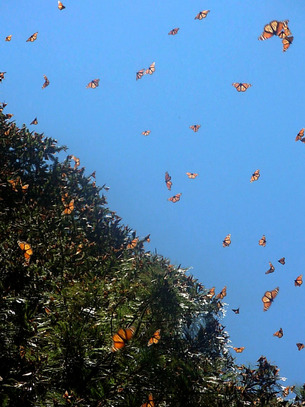A conversation with Arlene Sierra
| An epic struggle involving creatures of the utmost fragility was the subject of Monday's BBC Prom lunchtime concert. Butterflies Remember a Mountain is inspired by the annual mass migration of monarch butterflies from Canada to Mexico: each delicate insect making its infinitesimal contribution to the shimmering swarm; an unchanging annual cycle millions of years old; the sheer unimaginability of the scale of the endeavour, and a mysterious kink in the migration route are the source material for this intricate piece for piano trio. The insects fly south over Lake Superior. Half way across they take a right turn adding many hours before they reach the safety of the land. One popular explanation is that there was once a mountain blocking their path. Long since eroded away, the memory of it lives on in the insects’ genes. Butterflies Remember a Mountain was played by the Benedetti Elschenbroich Grynyuk Trio at the Cadogan Hall on Monday and can be heard for the next thirty days by clicking the button below. |
 photo: Ian Philips-McLaren
photo: Ian Philips-McLaren “It began when I was a student and came across Vitruvius’s Ten Books on Architecture – I discovered a wealth of information on classical forms, small and large scale structures and so on, with all their musical possibilities. Like a lot of texts from Classical antiquity, it was also shot through with odd theories of nature that were as fascinating as they were incorrect.” One such theory gave her the idea for an orchestral piece Aquilo, named after the NE wind.
Arlene studied East Asian Studies and Electronic Music at Oberlin College-Conservatory, in Ohio, but reading Vitruvius made her want to compose for the orchestra, developing approaches to form and structure in that medium. “I’d grown up playing the piano and listening to classical music, so this kind of composition was a natural arrival for me, even though I came to it relatively late.”
Having grown up in Miami and New York City, Arlene settled in London. Starting a new life far from where she grew up prompted her to set a number of Pablo Neruda’s (1904-1973) Odes to Common Things, which reflect on nature and memory.
Strategy and struggle are part of nature

Sierra, who divides her time between London and teaching at the University of Cardiff, describes these influences as found objects. Birdsong and insect behaviour remain a rich seam of ideas but running concurrently is a series of works inspired by military strategy. Her piano concerto The Art of War is inspired by writings ascribed to the 6th century BC Chinese military strategist Sun Tzu, and is also a response to the US invasion of Iraq and subsequent wars.
“That all sounds very different to butterflies and mountains” I suggest.
“But strategy and struggle are part of nature”, she responds. “When I write a piece about nature, it’s unflinching. It’s not meant to be idyllic or a simple pastoral reflection. It’s underpinned by a modern understanding. Of course I want to get the beauty across too. I’m moved by the beauty of nature, but there’s beauty in the complexity of nature and in the modern scientific understanding that earlier composers had no access to. In our time there’s also a sense of urgency, because humanity is altering nature in ways that may well be irreversible.”

It is a subject that, Arlene observes, is not without controversy in some parts of the world, including back home in the U.S. “It amazes me that parts of the States still have to contend with the denial of mainstream science, but it means a lot to me as a composer, to try to capture something of the power, and truth, of evolutionary theory through music.” Following performances of the work in New York, and the CD release by Bridge Records in 2014, Game of Attrition will be performed by the Alabama Symphony in October of this year.
Last year saw a major commission, Urban Birds, now available on the NMC label, in which three piano soloists play music in response to pre-recorded birdsong. Future plans include completing her opera Faustine, scoring a series of silent films by Maya Deren, and continuing to explore material for future volumes of Birds and Insects piano pieces. One such, Painted Bunting, was premiered by dedicatee Xenia Pastova in Leeds last week.
Currently Arlene is analysing the complex song of the bobolink, a bird of the American prairies, for another new piano work. “I’m amazed at the huge leaps in tessitura that can barely be detected at the song’s normal speed.” This leads us to ponder the very different way birds must perceive each others’ voices, compared to the sounds that we hear; we talk about the American hermit thrush and its ethereal and overtone-rich song somehow untypical of European birds.
“The natural world has become part of the environment in which I work, even though I’ve always been a city dweller” says Arlene. “With so many fascinating concepts and sources to draw from, I’m sure the natural world will continue to be an important part of my music.”
This is an updated version of a conversation that first appeared here on 4 September.

 RSS Feed
RSS Feed
